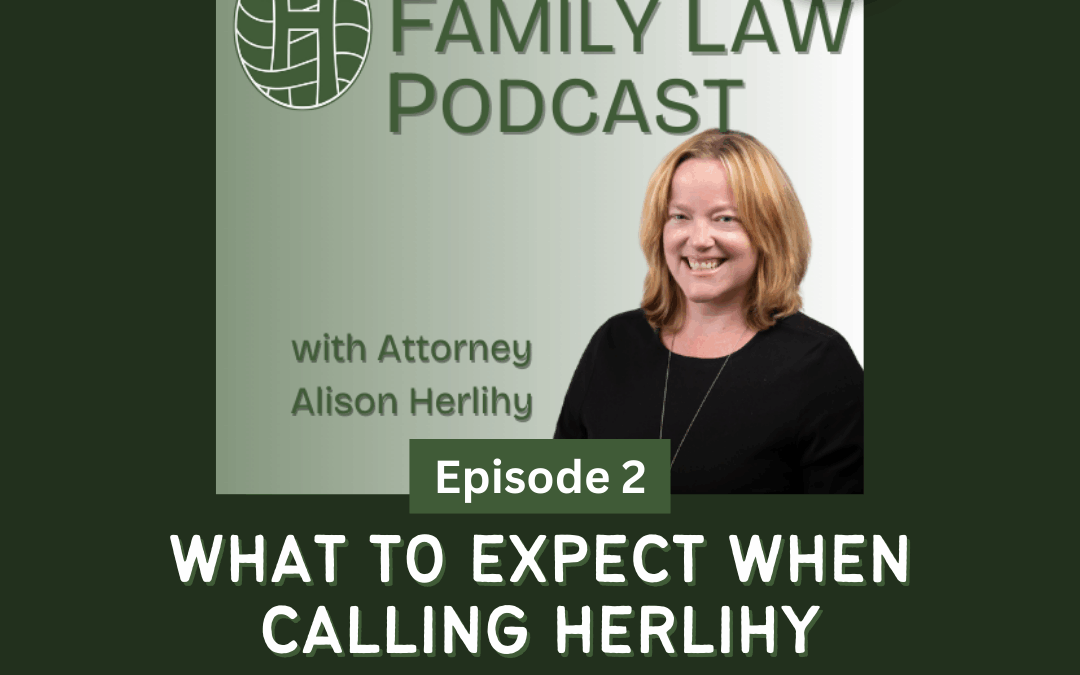
Podcast Episode #2: What to Expect When Calling Herlihy Family Law Firm
Podcast Episode #2: What to Expect When Calling Herlihy Family Law Firm
What to Expect When Calling Herlihy Family Law Firm
Reaching out to a family law firm can feel overwhelming, especially during stressful times. At Herlihy Family Law, we strive to make the process as smooth and transparent as possible. In Episode 2 of the Herlihy Family Law Podcast, host Attorney Alison Herlihy provides an inside look at what happens when you call our office. From what information we’ll need to why we follow specific procedures, this episode offers valuable insights to help you feel prepared and confident as you take the first step in your legal journey.
Why Can’t the Person Who Answers the Phone Just Tell Me What I Need to Know?
Our intake team is here to help, but they are not lawyers. It is against the law for anyone who is not a licensed attorney to practice law, which includes providing legal advice. While our team can assist with scheduling and general inquiries, legal guidance can only come from an attorney during your consultation.
Why Can’t Someone Else Schedule the Appointment on My Behalf?
We require the person seeking legal advice to schedule their own appointment to ensure the integrity of the process.Imagine a man calls our office and says he wants to schedule an appointment for his daughter, who is getting divorced. While this might seem harmless, we have no way of verifying that the caller is truly the prospective client’s father. It could just as easily be her spouse trying to gather information sneakily about whether she’s contacted us or what her plans might be.
Additionally, confidentiality is a cornerstone of our practice. The client’s information is protected, and we cannot share it with family members, friends, or anyone else. By requiring the person seeking legal advice to schedule the appointment themselves, we ensure that their privacy is fully respected and maintained.
If calling during business hours is not safe or possible, we also offer the option to schedule appointments online through our website. This flexibility ensures that you can take the necessary steps to protect your rights and interests in a way that works best for your situation.
Can I Bring Someone to the Appointment With Me?
While we understand the need for emotional support during a challenging time, we recommend attending the appointment alone. Attorney-client privilege ensures that conversations between you and your attorney remain confidential and cannot be disclosed, except in very specific emergency situations.
However, this privilege does not apply if someone else is present during the consultation. For example, if you bring a family member or friend to the meeting, the conversation is no longer protected under attorney-client privilege. This could result in complications later—such as during a divorce trial—where you or the person who attended the consultation with you might be required to testify about what was discussed.
To protect your privacy and legal interests, it’s best to attend your consultation alone.
Why Is There a Consultation Fee?
The consultation fee is charged because you receive up to 60 minutes of dedicated legal advice directly from an attorney during your consultation. This is not a quick chat with a paralegal or office staff—it’s a focused, in-depth session with a legal professional to address your specific situation. The fee reflects the value of the attorney’s time, expertise, and the advice provided.
Why Do You Need My Name and the Opposing Party’s Name Before I Can Even Book an Appointment?
Before scheduling an appointment, we check for potential conflicts of interest to ensure we can ethically represent you. If we have already consulted with or represented the opposing party, we cannot take your case. This policy upholds our commitment to professional ethics and protects your interests.
Why Do I Have to Provide So Much Information Prior to My Consultation?
The information we request before your consultation helps us prepare thoroughly for your case. By providing details such as demographics, financial information, and any relevant issues, we can spend the consultation focusing on your specific needs rather than gathering basic information. This preparation ensures your time with us is as productive as possible.
Is My Information Confidential?
Yes, your information is completely confidential. We do not disclose that you have had an appointment with us to anyone. If your spouse contacts us seeking representation, we will inform them of a conflict of interest without providing any additional details. Your privacy is our top priority.
Can My Spouse Find Out That I Had a Consultation With You?
If your spouse contacts us to seek legal services, we are obligated to inform them of a conflict of interest. However, we will not disclose why there is a conflict or provide any information about your consultation. Your privacy and confidentiality are strictly maintained.
It’s a great idea to bring something to take notes during your consultation. This helps you remember important details, especially during a stressful time when it’s easy to forget what was discussed. Whether you prefer handwriting, using a notes app, or typing on a laptop, make sure your method is secure to protect sensitive information. Additionally, preparing a list of questions beforehand ensures you make the most of your time with the attorney. Tune in to the Herlihy Family Law Podcast today to learn more!





